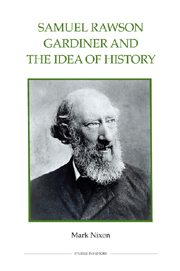Summary
Gardiner produced a number of different kinds of historiographical discourse. He wrote school textbooks, he was a popular lecturer to university and wider audiences, he was a reviewer of some industry in a number of journals and newspapers, he wrote the histories for which he is famous, and he produced short biographical articles for reference works and, indeed, a full-length biography of Cromwell. If Gardiner as a writer is to be understood, it is necessary to consider the different forms of writing that he practised. Furthermore, Gardiner was always ready to use forms of writing not usually considered historiographical, such as drama, in his work. Therefore, any consideration of Gardiner as a writer must also reach out to such forms of writing and what they say about his own approach to the writing of history. This chapter will seek to do that, using case studies of his theory and practice of biography and historiography and his use of drama in his presentation of Thomas Wentworth.
Gardiner's single-volume study of Cromwell was his only published product ‘from a biographical point of view’. This use of the phrase ‘point of view’ immediately suggests that Gardiner saw biography as conceptually different from historiography. As he went into print as a reviewer, his comments on the biographies of others also provide the student of Gardiner with a great deal of access to his thinking on the role of biography and what should be expected of those who write it.
- Type
- Chapter
- Information
- Samuel Rawson Gardiner and the Idea of History , pp. 121 - 160Publisher: Boydell & BrewerPrint publication year: 2011



